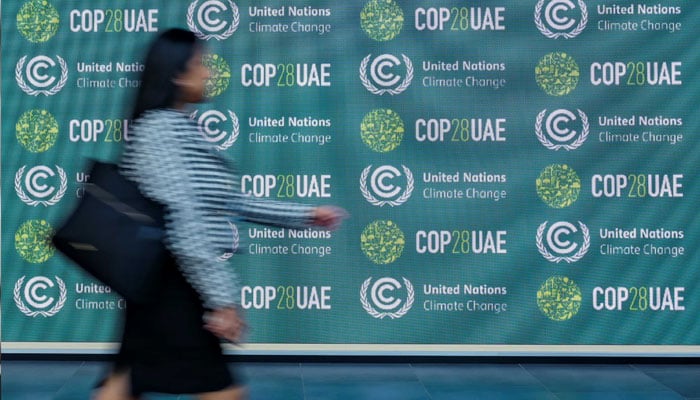Nations pledge to triple world’s renewable energy at COP28 climate talks
DUBAI: More than 110 nations pledged to triple the world’s renewable energy within seven years at UN climate talks Saturday as the United States pushed to slash methane emissions and boost nuclear capacity.
With smoggy skies in Dubai highlighting the challenges facing the world, leaders at the COP28 conference threw their support behind voluntary pledges aimed at ramping up alternatives to fossil fuels.
A massive deployment of solar, wind, hydroelectric and other renewables is crucial to efforts to displace demand for planet-heating coal, oil and gas and achieve net-zero carbon emissions by 2050.
The nearly 200 nations negotiating a COP28 climate deal face tougher talks over the next two weeks on the fate of fossil fuels. More than half signed up to a commitment to trippling global renewable energy capacity and doubling energy efficiency by 2030, the COP28’s Emirati presidency said.
But major oil producers including Russia, Saudi Arabia and Iran, and top consumer China were not on the list. “I do need more, and I’m kindly requesting all parties to come on board as soon as possible please,” COP28 president Sultan Al Jaber told delegates.
“This can and will help transition the world away from unabated coal,” said Jaber, who also heads the UAE’s national oil company and a renewable energy firm.
Clean power advocates welcomed the commitment but said it must be accompanied by the phase-out of dirtier forms of energy.
“The future will be powered by solar and wind, but it won’t happen fast enough unless governments regulate fossil fuels out of the way,” said Kaisa Kosonen, the head of Greenpeace’s COP28 delegation.
Jaber also announced a pledge by oil and gas companies representing 40 percent of global production, including his UAE firm ADNOC and Saudi giant Aramco, to decarbonise their operations by 2050.
But the pledges do not include emissions when the fuels are used by their customers, and were criticised for repackaging previous, nonbinding commitments.
The US Environmental Protection Agency announced earlier that it would tighten curbs on methane emissions from its oil and gas industry.
China agreed for the first time to include all greenhouse gases in its next national climate pledge for 2035 in an agreement with the United States last month.
Methane is responsible for about one-third of the warming from greenhouse gases occurring today, second only to CO2.
While COP28 rallied behind renewables, the United States led a call by more than 20 nations for the world to triple nuclear energy capacity by 2050.
US Vice President Kamala Harris announced a $3 billion contribution to a global fund to help developing countries with the energy transition and the effects of climate change -- its first pledge to it since 2014.
“Today, we are demonstrating through action how the world can and must meet this crisis,” Harris said.
-
 James Van Der Beek's Friends Helped Fund Ranch Purchase Before His Death At 48
James Van Der Beek's Friends Helped Fund Ranch Purchase Before His Death At 48 -
 King Charles ‘very Much’ Wants Andrew To Testify At US Congress
King Charles ‘very Much’ Wants Andrew To Testify At US Congress -
 Rosie O’Donnell Secretly Returned To US To Test Safety
Rosie O’Donnell Secretly Returned To US To Test Safety -
 Meghan Markle, Prince Harry Spotted On Date Night On Valentine’s Day
Meghan Markle, Prince Harry Spotted On Date Night On Valentine’s Day -
 King Charles Butler Spills Valentine’s Day Dinner Blunders
King Charles Butler Spills Valentine’s Day Dinner Blunders -
 Brooklyn Beckham Hits Back At Gordon Ramsay With Subtle Move Over Remark On His Personal Life
Brooklyn Beckham Hits Back At Gordon Ramsay With Subtle Move Over Remark On His Personal Life -
 Meghan Markle Showcases Princess Lilibet Face On Valentine’s Day
Meghan Markle Showcases Princess Lilibet Face On Valentine’s Day -
 Harry Styles Opens Up About Isolation After One Direction Split
Harry Styles Opens Up About Isolation After One Direction Split -
 Shamed Andrew Was ‘face To Face’ With Epstein Files, Mocked For Lying
Shamed Andrew Was ‘face To Face’ With Epstein Files, Mocked For Lying -
 Kanye West Projected To Explode Music Charts With 'Bully' After He Apologized Over Antisemitism
Kanye West Projected To Explode Music Charts With 'Bully' After He Apologized Over Antisemitism -
 Leighton Meester Reflects On How Valentine’s Day Feels Like Now
Leighton Meester Reflects On How Valentine’s Day Feels Like Now -
 Sarah Ferguson ‘won’t Let Go Without A Fight’ After Royal Exile
Sarah Ferguson ‘won’t Let Go Without A Fight’ After Royal Exile -
 Adam Sandler Makes Brutal Confession: 'I Do Not Love Comedy First'
Adam Sandler Makes Brutal Confession: 'I Do Not Love Comedy First' -
 'Harry Potter' Star Rupert Grint Shares Where He Stands Politically
'Harry Potter' Star Rupert Grint Shares Where He Stands Politically -
 Drama Outside Nancy Guthrie's Home Unfolds Described As 'circus'
Drama Outside Nancy Guthrie's Home Unfolds Described As 'circus' -
 Marco Rubio Sends Message Of Unity To Europe
Marco Rubio Sends Message Of Unity To Europe




